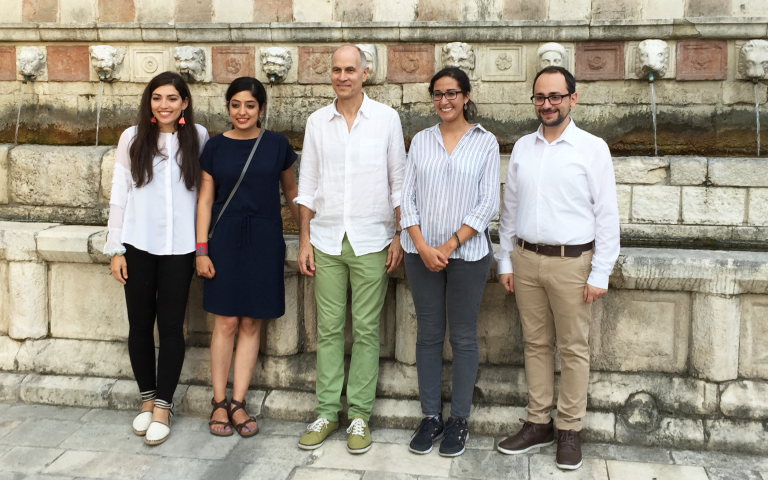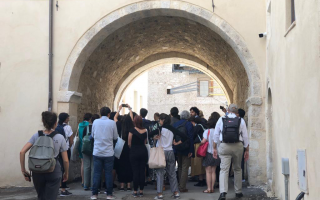UCL collaborates with Italy’s University of L’Aquila on Silk Cities Conference
24 July 2019
With support from the UCL Cities partnerships Programme, UCL co-hosted a conference with Italy's L'Aquila University exploring the preservation of historic cities

This month saw UCL co-host the third International ‘Silk Cities Conference’ with the Department of Human Sciences and the Department of Civil Construction-Architectural and Environmental Engineering of the University of L’Aquila, Italy, focusing on the themes of ‘Reconstruction, Recovery and Resilience in Historic Cities and Societies’.
Taking place in L’Aquila, central Italy, ten years on from the earthquake that devastated the city and surrounding area in 2009, the three-day event brought together experts from areas such as cultural heritage, urban planning, disaster studies, economics, psychology, architecture, risk management and reconstruction to exchange knowledge and discuss the issues particular to historic cities at risk throughout the world.
Bringing together global knowledge
The conference was co-organised by Dr Fatemeh Farnaz Arefian of Silk Cities (an independent initiative concerned with the urban challenges faced by historical cities in countries along the historic Silk Roads) with L’Aquila-born Dr Lucia Patrizio Gunning of UCL (Faculty of Social & Historical Sciences) and Professor Paola Rizzi of the University of L’Aquila.
By organising the conference, the team hoped to bring together global knowledge and generate new perspectives and strategies on urban processes, reconstruction approaches and heritage issues, and improve the future of post-crisis reconstruction in historic cities.

Dr Patrizio Gunning gained support for the conference through the UCL Cities partnerships Programme (CpP), the UCL-initiative which funds, supports and promotes academic activity in global cities.
She said, “There is a natural thread connecting L’Aquila with the Silk Cities; from the medieval web of trade in silk, wool and saffron, to the dense historic urban fabric that they all share.
“L’Aquila displayed fortitude and resilience in the aftermath of disaster and this is slowly transforming into a renaissance of civic pride. As this beautiful city re-emerges, it seems fitting that it should host the 2019 Silk Cities conference addressing the themes particular to historic cities at risk."
Across disciplines
Dr Florian Mussgnug, CpP Academic Director for Rome, added: “The gravity of the unfolding global environmental crisis demands new forms of collaboration and international dialogue, across disciplines. This impressive conference confirms the importance of transdisciplinary attention to cultural heritage and community life, both as objects of study and as sites of cultural and political activism.
"The involvement of local communities and of specialists from every part of the world created an exciting space for knowledge transfer and marks a great success for UCL’s Global Engagement Strategy.”
Among attendees at the event were academics, professionals and sponsored students from Chile, Cyprus, Guatemala, Haiti, India, Iran, Iraq, Japan, Lebanon, Libya, Mexico, New Zealand, Pakistan, Peru, Spain, Syria, USA and Vietnam, as well as many specialists from Italy and the UK.
Bartlett travel bursaries
UCL’s Bartlett Development Unit awarded six student travel bursaries to allow students from underprivileged countries to attend the conference.
One of the award holders, architect Judy Mahfouz, commented: “The conference was very inspiring for me. Earlier this year I was in Aleppo and witnessed a devastated city at all levels, socially, economically, physically and culturally. L'Aquila showed me hope for what Aleppo could become”.
Professor Rizzi said: “The Silk Cities Conference is a unique opportunity to embrace different points of view rooted in different contexts as well as to reflect on resilience, the capability to keep essential urban activities operational. The future of historic cities will depend on whether we’ll be able to consider reconstruction as a real opportunity to reshape them.”
Role of cultural heritage
From 10-12 July, sessions investigated the role of cultural heritage in building civic identity, as a stimulus for recovery, a focus for tourism and as a means to building resilience forms one thread.
A second strand of sessions looked at information technology in smarter reconstruction, preparedness and civic resilience and its use as a tool for public engagement and participation.
The conference also examined human factors: the narratives of approach to disaster and recovery, the social and psychological aspects of recovery and how to engage the next generation of citizens.
In bringing this conference to the centre of L’Aquila this year, the convenors were keen to show how the city, after a decade of uncertainty and struggle, is finally coming back to life and to bring the beauty of its historic heritage to an international audience.
 Close
Close

